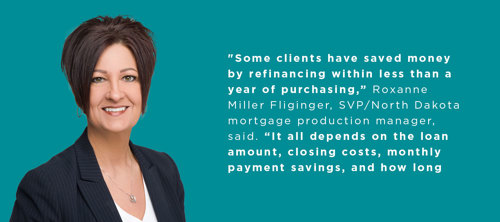Take On Refinancing with Experts: Save More by Ditching 4 Common Myths
Refinancing your home can save you thousands of dollars. But it’s not the right choice in every situation. That’s why it’s necessary for homeowners to do their research surrounding this option.
As mortgage experts, we see a ton of misleading or flat-out false beliefs about refinancing. It’s a topic that causes plenty of confusion. Luckily, we can draw from experience as we oversee hundreds of refinanced loans each year.
Below, we’ll give you a crash course on refinancing, how it could help you, and 4 refinancing myths that cost uninformed homeowners big money.
What we’ll cover
- What is refinancing?
- Why would I want to refinance?
- 4 refinancing myths that cost homeowners big money.
- See if refinancing is right for you.
What is refinancing?
Let’s take a step back. Mortgages can feel complex, with industry terms you might not be familiar with. But we can help you get there.
Refinancing means taking out a new loan to pay off your current one. It’s a way to take another look at your mortgage and adjust for the present situation.
For many people, a home is the largest asset they own. That makes it a cornerstone of financial health. Small or incremental changes have a huge impact on any large investment, which is where refinancing can come into play.
Why would I want to refinance?
After a few years, your priorities and finances might change. Not to mention external factors, like the housing market and mortgage rates.
Refinancing can make sense in a variety of situations, such as:
- A low rate environment: One of the most common reasons to refinance your home is a lower rate environment. Mortgage rates are based on the current economic situation and can change drastically over time.
- Using your equity: With each mortgage payment, you gain equity in your property. Equity is your money, and there are many reasons you might want to use it rather than let it accrue. Refinancing to access cash from your home equity is called cash-out refinancing.
- Expert Tip! If you don’t want to refinance your home loan to access your equity, consider a home equity loan.
- Improved financial situation: With any personal financial improvements since you bought your home, you could be eligible for better options or different loan types. Refinancing into a loan reserved for those with high credit scores could offer better rates and terms.
4 refinancing myths that cost homeowners big money.
Myth #1: You need cash on hand for closing costs.
When you refinance, you’ll work with Western State Bank’s mortgage experts to develop a plan based on your goals and needs.
And there are different factors that determine the cash you’ll need for closing costs, like:
- How much equity you’ve built
- Your current loan program
- Which loan program makes sense for you now
Often, customers can include the closing costs in the new loan or avoid them entirely—resulting in no upfront costs for refinancing.
Myth #2: You need to wait at least 5 years before refinancing.
Your situation is unique. It’s best to forget any hard-set rules and consider the specifics of your loan.
“Some clients have saved money by refinancing within less than a year of purchasing,” Roxanne Miller Fliginger, SVP/North Dakota mortgage production manager, said. “It all depends on the loan amount, closing costs, monthly payment savings, and how long they plan to stay in the home.”

Roxanne recommends stopping in to discuss your options with an expert. They can review your finances and let you know how long it will take to recoup your closing costs.
Myth #3: Appraisals are always required to refinance.
We get it. Appraisals can be a headache. It’s an important part of the loan process, but that doesn’t mean it’s fun.
But when refinancing a loan, you may be able to avoid an appraisal altogether.
- Property Inspection Waiver: In some cases, we’re able to obtain a Property Inspection Waiver (PIW) for refinancing loans. It’s not something we can guarantee, but it does mean we can skip the appraisal to make the process easier on you.
- VA Interest Rate Reduction Refinance Loans: If you have a VA loan and can reduce your rate by at least .5% through refinancing, you may qualify for a VA IRRRL. Through this program, you won’t need an appraisal, and we can roll your closing costs into the new loan.
Myth #4: If your neighbor refinances, you should too.
We’ll refer you back to myth #2.
Even if you have similar homes in the same neighborhood, you may have a completely different loan situation than your neighbor.
Your neighbor could be:
- Adjusting their loan term length
- Switching from a variable to fixed rate mortgage
- Consolidating debt
- Taking out equity to pay for home improvements
- Refinancing from a higher rate
Each home and loan is unique. It’s impossible to tell what makes sense for you without having an in-depth conversation about where you are and where you want to be.
See if refinancing is right for you.
Refinancing is a big topic, and as a homeowner, you can benefit from knowing more about the process.
But this isn’t a one-size-fits-all solution. To figure out the details, set up some time to talk it through with one of our experts. We look forward to meeting with you, answering your questions, and making a plan to achieve your financial goals.